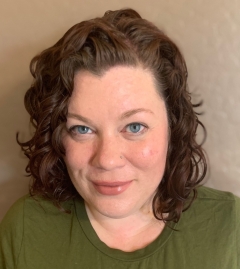Love for writing shows in ways ASU professor mentors students
Austin Davis can recall the first time he met Jenny Irish.
It was Davis’ freshman year at Arizona State University, and he was submitting a portfolio to try to get into the creative writing concentration in the Department of English.
Irish, an assistant professor, was guest speaking at a fiction seminar, and she engaged Davis in a conversation about his portfolio.
“She was just incredibly encouraging,” Davis said. “I could see immediately how much love was connected with Jenny, in the way she edits poems, the way she gives feedback, the way she just encourages you to do that reading, write that poem, submit that piece.
“It was a period of transition for me, a time of great growth, and having someone around like that to just provide pure support and the best kind of feedback was just invaluable.”
Davis graduated in 2022, but his connection with Irish remains strong. On Feb. 1 she will host a book launch event at the Memorial Union for Davis and his newest book of poetry, “Compulsive Swim,” which addresses the fentanyl crisis, the housing crisis and the mental health crisis in Arizona.
“It’s just really wonderful to have her in my life in that manner,” Davis said.
In addition to mentoring, Irish also writes. Her latest book, “Lupine,” is scheduled for a March release and has been chosen by Independent Book Review as one of the “most anticipated indie books of 2023.”
Here’s how "Lupine" is described by the publishing company Black Lawrence Press: “ 'Lupine' is a gathering of feminist prose poetry engaging themes of ecology, animality and the human unknown. A series of interconnected dramatic monologues, the poems inhabit the personae of figures traditionally deemed Monstrous, giving them voice to confront and reclaim the violent mythologies that have so often been imposed upon them.”
Irish said the poems reflect how women in power historically have been “positioned as villains.”
“One of the things I hope this collection will do is examine the ways in which the female and the animal have often been sort of (connected),” she said. “That intersection where I think female power and female desire are often presented in these ways that are animalistic. There is something about that that is frightening and often presented historically and culturally as being unnatural and dangerous, as something that needs to be reined in, tamed and corrected.
“For women, for girls, there is often a period of time where their greatest power is in their body being something that is desired, being something that others want access to. With that, I think, comes an element of danger and an element of being commodified, of not being recognized as a full person. Truly being objectified.”
Irish’s ability to write in so many different veins — her works of fiction, poetry and hybrid writing have appeared in journals including Blackbird, Conduit, the Michigan Quarterly Review and Ploughshares — make her an ideal mentor for students, said Sally Ball, the director of creative writing at ASU.
Irish can identify with students who don’t necessarily want to color inside the lines with their writing, so to speak.
Davis immediately noticed that in his conversations with her.
“To have someone who can tell you, ‘Hey, you can write that poem the way you want to write it. You can express yourself the way you need to express yourself,’ is so important," Davis said. “I don't know if permission is the right word, but just saying, ‘Hey, that's an OK thing to do. That’s still a valuable, valid piece of art that you're creating, even if it doesn't fit inside the boundaries of one genre.’ That’s definitely something I really connected with.”
Ball added, “Jenny’s range probably inspires students who seek out and read her work (and think) it’s possible to do this and this. But one thing that makes her such a good mentor is that she’s replying to the work in front of her, to the writer in front of her, listening for what a given story is percolating for itself, and in fact not imposing her own aesthetic on it.
“A big part of teaching is listening, and Jenny is a deep listener.”
That affection for and encouragement of students is balanced by a seriousness regarding the craft. Put simply, Irish expects the work to be put in.
“Jenny offers a really nourishing balance of kindness and keenness,” Ball said. “She conveys warmth and encouragement and also, simultaneously, she pushes hard on language, what language can do, the space between what a person hopes they’ve put on the page and what is actually there.
“Jenny’s attention is so acute that in one-on-one conversations about a student’s writing, the primary thing they feel is seriousness. She’s taking their work seriously, expecting a lot from it, and showing them how to move it closer to fulfilling its promise. And that seriousness is a game changer for a writer, to be read as if it actually matters how you say every single thing.”
Irish hopes that love for writing is one of the takeaways people have after reading “Lupine.”
“Writing is such a powerful tool, but I also think writing can just be fun,” she said. “I want people to have those experiences simultaneously. When we put our writing out into the world, we may have had intentions for it when we were writing it. We may have hopes and goals, but we need to let those go and let people experience it.
“There’s something collaborative between readers and writers, and we have to trust our readers. We put something out into the world, and it’s then in their hands to do with it what they will.”
“Lupine” is available for preorder through the Black Lawrence website. Find out more information about Austin Davis' book launch event on the Department of English site.

